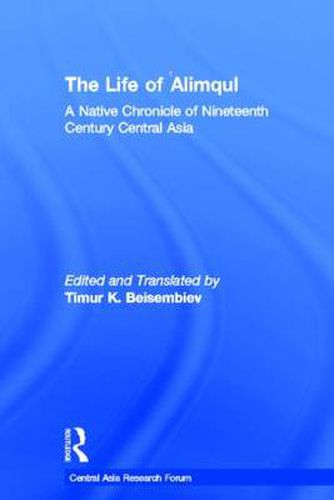Readings Newsletter
Become a Readings Member to make your shopping experience even easier.
Sign in or sign up for free!
You’re not far away from qualifying for FREE standard shipping within Australia
You’ve qualified for FREE standard shipping within Australia
The cart is loading…






The history of Central Asia in the mid-19th century - a crucial period of its conquest by the Russian Empire - remains poorly studied due to the narrow base of sources, which consists of local narratives written in manuscript form on paper, in Arabic script and in two literary languages of Central Asia: Transoxianian Persian and Chaghatay Turkic. This work studies a narrative devoted to the history of the Kokand Khanate, a state that played a great role in Central Asian history in the 18th and 19th centuries, controlling territory equal to continental western Europe, until it was conquered by the Russian Empire in 1876. This unique manuscript, discovered by the editor in Tashkent, is a biography of Alimqul Amir-i Lashkar, commander-in-chief of the Kokand army and de facto ruler of the Kokand state in 1863-1865, who died in battle at the age of thirty three. Shortly after his death, Tashkent was captured by Russian troops. The author of this biography was an intimate friend of Alimqul and was actively involved in politics. The leading trend in the political history of Kokand before the Russian conquest was the struggle for power between sedentary and nomadic aristocracie in the Ferghana valley. The biographer gives a vivid picture of political life in Kokand during 1852-1865 (with skilful descriptions of various military campaigns) as well as his own views of Russo-Kokand relations in the period 1828-1865. Showing the involvement of Kokand in the Muslim uprising against the Chinese in Kashgaria, the biography sheds new light on the deep influence Kokand political and ideological values had upon the structure of the Muslim state existing in Chinese Turkistan in 1865-1878. This biography is a rare expression of the ambitions and views of the nomadic faction.
$9.00 standard shipping within Australia
FREE standard shipping within Australia for orders over $100.00
Express & International shipping calculated at checkout
Stock availability can be subject to change without notice. We recommend calling the shop or contacting our online team to check availability of low stock items. Please see our Shopping Online page for more details.
The history of Central Asia in the mid-19th century - a crucial period of its conquest by the Russian Empire - remains poorly studied due to the narrow base of sources, which consists of local narratives written in manuscript form on paper, in Arabic script and in two literary languages of Central Asia: Transoxianian Persian and Chaghatay Turkic. This work studies a narrative devoted to the history of the Kokand Khanate, a state that played a great role in Central Asian history in the 18th and 19th centuries, controlling territory equal to continental western Europe, until it was conquered by the Russian Empire in 1876. This unique manuscript, discovered by the editor in Tashkent, is a biography of Alimqul Amir-i Lashkar, commander-in-chief of the Kokand army and de facto ruler of the Kokand state in 1863-1865, who died in battle at the age of thirty three. Shortly after his death, Tashkent was captured by Russian troops. The author of this biography was an intimate friend of Alimqul and was actively involved in politics. The leading trend in the political history of Kokand before the Russian conquest was the struggle for power between sedentary and nomadic aristocracie in the Ferghana valley. The biographer gives a vivid picture of political life in Kokand during 1852-1865 (with skilful descriptions of various military campaigns) as well as his own views of Russo-Kokand relations in the period 1828-1865. Showing the involvement of Kokand in the Muslim uprising against the Chinese in Kashgaria, the biography sheds new light on the deep influence Kokand political and ideological values had upon the structure of the Muslim state existing in Chinese Turkistan in 1865-1878. This biography is a rare expression of the ambitions and views of the nomadic faction.